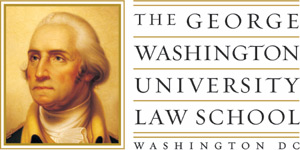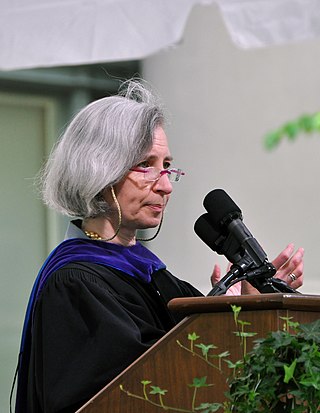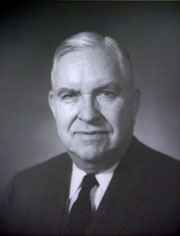Jerome A. Barron is the Harold H. Greene Professor of Law at the George Washington University Law School and a former dean of the law school. He is primarily known for his influence about the doctrine of free speech in the United States. [1]
Jerome A. Barron is the Harold H. Greene Professor of Law at the George Washington University Law School and a former dean of the law school. He is primarily known for his influence about the doctrine of free speech in the United States. [1]
Barron received his Bachelor of Arts from Tufts University, his Juris Doctor from Yale Law School, and received his Master of Laws from George Washington Law School in 1960. After graduation, he moved to Boston to begin his legal practice. [2]
Barron clerked for a year for Marvin Jones, the chief judge of the U.S. Court of Claims. [2]
Barron argued the cause for appellees in Miami Herald Publishing Co. v. Tornillo, 418 U.S. 241 (1974), after arguing the case before the Florida and United States Supreme Courts. [1]
Barron joined the faculty in 1965. In 1967, the Harvard Law Review published Barron's article "Access to the Press—A New First Amendment Right." [3] In the article, Barron argued that the press did not cover the free marketplace of ideas; instead concentrated corporate ownership effectively censored free speech and quelled unorthodox ideas. [2] He suggested that the government should be more active in forcing publishers to diversify the range of opinions in their material. [1]
On October 12, 2007, a symposium was held to commemorate the 40th anniversary of Barron’s seminal article in the Harvard Law Review calling for an affirmative First Amendment right to access the press. [4] U.S. Supreme Court Justice Stephen G. Breyer was one of the speakers at the event. [5]
He served as dean of the Law School from 1979 to 1988.[ citation needed ]
Barron holds one of the prestigious endowed professorships at The George Washington University - Harold H. Greene Professor of Law, established in 2000. Barron also held the endowed professorship of Lyle T. Alverson Professor of Law. [6]
With his wife Myra, Barron is the father of three children, Jennifer Barron, Jonathan Barron, and David Barron. [2] David Barron serves as a judge on the United States Court of Appeals for the First Circuit. [7] Jonathan Barron is an English professor at the University of Southern Mississippi. Jennifer Barron is an appellate attorney in Chicago, IL.

The Federalist Society for Law and Public Policy Studies is an American conservative and libertarian legal organization that advocates for a textualist and originalist interpretation of the U.S. Constitution. Headquartered in Washington D.C., it has chapters at more than 200 American law schools and features student, lawyer, and faculty divisions. The lawyers division comprises more than 70,000 practicing attorneys in ninety cities. Through speaking events, lectures, and other activities, it provides a forum for legal experts of opposing views to interact with members of the legal profession, the judiciary, and the legal academy. It is one of the most influential legal organizations in the United States.

Laurence Henry Tribe is an American legal scholar who is a University Professor Emeritus at Harvard University. He previously served as the Carl M. Loeb University Professor at Harvard Law School.

The William S. Richardson School of Law is the professional graduate law school of the University of Hawaii at Manoa. Located in Honolulu, Hawaii, the school is named after its patriarch, former Hawaii State Supreme Court Chief Justice William S. Richardson, a zealous advocate of Hawaiian culture, and is Hawaii's only law school.
Guido Calabresi is an Italian-born American legal scholar and Senior United States circuit judge of the United States Court of Appeals for the Second Circuit. He is a former Dean of Yale Law School, where he has been a professor since 1959. Calabresi is considered, along with Ronald Coase and Richard Posner, a founder of the field of law and economics.

John Hart Ely was an American legal scholar. He was a professor of law at Yale Law School from 1968 to 1973, Harvard Law School from 1973 to 1982, Stanford Law School from 1982 to 1996, and at the University of Miami Law School from 1996 until his death. From 1982 until 1987, he was the 10th Dean of Stanford Law School.

The George Washington University Law School is the law school of George Washington University, in Washington, D.C. Established in 1865, GW Law is the oldest top law school in the national capital. GW Law offers the largest range of courses in the US, with 275 elective courses in business and finance law, environmental law, government procurement law, intellectual property law, international comparative law, litigation and dispute resolution, and national security and U.S. foreign relations law. Admissions are highly selective as the law school receives thousands of applications. In 2020, the acceptance rate was 21%.

Erwin Chemerinsky is an American legal scholar known for his studies of United States constitutional law and federal civil procedure. Since 2017, Chemerinsky has been the dean of the UC Berkeley School of Law. Previously, he also served as the inaugural dean of the University of California, Irvine School of Law from 2008 to 2017.
Anti-Federalist Papers is the collective name given to the works written by the Founding Fathers who were opposed to or concerned with the merits of the United States Constitution of 1787. Starting on 25 September 1787 and running through the early 1790s, these Anti-Federalists published a series of essays arguing against a stronger and more energetic union as embodied in the new Constitution. Although less influential than their counterparts, The Federalist Papers, these works nonetheless played an important role in shaping the early American political landscape and in the passage of the United States Bill of Rights.
Kathleen Marie Sullivan is an American lawyer and name partner at Quinn Emanuel Urquhart & Sullivan, a global, litigation-only law firm headquartered in Los Angeles, California. Based in the firm's New York City office, Sullivan chairs its national appellate practice group. She is the first and only female name partner at an Am Law 100 law firm. Previously, Sullivan served as dean of Stanford Law School, where she was the Stanley Morrison Professor of Law.
Bernard Bell is the Associate Dean for Academic Affairs and Faculty Professor of Law and Herbert Hannoch Scholar at Rutgers School of Law–Newark.
Geoffrey R. Stone is an American law professor and noted First Amendment scholar. He is currently the Edward H. Levi Distinguished Service Professor of Law at the University of Chicago Law School.
Rodney A. Smolla, is an American author, First Amendment scholar and lawyer. He is currently the president of the Vermont Law School, and former dean of the Widener University Delaware Law School until spring 2022. He was the 11th president of Furman University. In 2015, it was announced that on 1 July of that year, Smolla would become the dean of the newly separate Delaware Law School of Widener University.

Martha Louise Minow is an American legal scholar and the 300th Anniversary University Professor at Harvard University. She served as the Dean of Harvard Law School between 2009 and 2017 and has taught at the Law School since 1981. Minow was one of the candidates mentioned to replace U.S. Supreme Court Associate Justice John Paul Stevens upon his retirement. She has been called "one of the world's leading human rights scholars" and "one of the world's leading figures in bringing legal ideas and scholarship to bear on issues of identity, race and equality, including innovative approaches to reconciliation among divided peoples."

Erwin Nathaniel Griswold was an American appellate attorney who argued many cases before the U.S. Supreme Court. Griswold served as Solicitor General of the United States (1967–1973) under Presidents Lyndon B. Johnson and Richard M. Nixon. He also served as the dean of Harvard Law School for 21 years. Several times he was considered for appointment to the U.S. Supreme Court. During a career that spanned more than six decades, he served as member of the U.S. Commission on Civil Rights and as president of the American Bar Foundation.

John F. Manning is an American educator and lawyer. Manning is currently the Morgan and Helen Chu dean and professor of Harvard Law School.
Monroe Henry Freedman was a professor of law and the former dean at Hofstra Law School. He lectured at Harvard Law School annually for 30 years, and was a visiting professor at Georgetown Law School from 2007 to 2012. He has been described as "a pioneer in the field of legal ethics" and "one of the nation's leading experts on legal ethics."

David Jeremiah Barron is an American lawyer who serves as the Chief United States circuit judge of the United States Court of Appeals for the First Circuit and former S. William Green Professor of Public Law at Harvard Law School. He previously served as the Acting Assistant Attorney General of the Office of Legal Counsel at the United States Department of Justice.
Martin H. Redish is the Louis and Harriet Ancel Professor of Law and Public Policy at the Northwestern University Pritzker School of Law. Redish has written 19 books and over a hundred law review articles in the areas of civil procedure and constitutional law, among others. He is among the most frequently cited American legal scholars.
Catherine J. Ross is the Fred C. Stevenson Research Professor of Law at The George Washington University Law School where she is a constitutional law expert specializing in the First Amendment and civil liberties more generally as well as family law and issues affecting children and families including education and child custody.

Gregory Eaton Maggs is an American lawyer who serves as a judge of the United States Court of Appeals for the Armed Forces. He was previously the Arthur Selwyn Miller Research Professor of Law and Co-Director of the National Security & U.S. Foreign Relations Law Program at the George Washington University Law School.